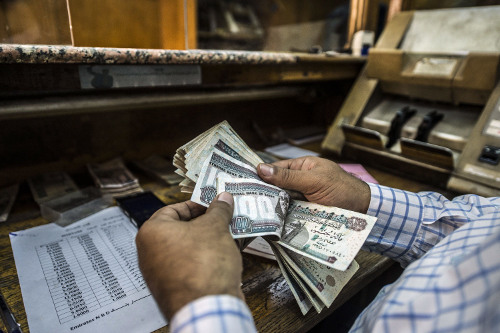Egypt secures IMF deal after biggest-ever rate hike, pound devaluation

TLDR
- Egypt secures $9 billion funding from IMF and a $1.2 billion loan for environmental sustainability, resulting in significant economic stabilization measures and currency depreciation.
- Central bank's float of Egyptian pound and major rate hike contribute to stabilizing economy, despite falling slightly below some analysts' expectations.
- Egyptian pound's depreciation leads to exchange rate climbing above 50 pounds to the dollar, a notable increase from previous rates.
On Wednesday, Egypt secured an expanded $8 billion deal with the International Monetary Fund (IMF), following the central bank's decision to float its currency and implement a significant 600 basis points rate hike — the largest ever recorded. These measures were aimed at stabilizing the economy.
In addition to the IMF agreement, Egypt also secured a $1.2 billion loan focused on environmental sustainability, bringing its total funding from the IMF to over $9 billion, as announced by the government. This amount fell towards the lower end of some analysts' expectations.
The Egyptian pound experienced a notable depreciation, surpassing 50 Egyptian pounds to the dollar, a considerable increase from the previous rate of about 30.85 pounds. Egypt had been striving to maintain this rate for several months. The day concluded with the exchange rate closing at 49.4 to the dollar.
Key Takeaways
A more flexible exchange rate is widely regarded as crucial for reinstating investor confidence and has been a primary demand of the International Monetary Fund (IMF). The IMF has been engaged in discussions to expand its current $3 billion support program for Egypt, the most populous nation in the Arab world. Historically, Egypt has expressed intentions to transition to a more flexible exchange rate, only to revert to tightly managing the currency whenever the Egyptian pound weakened. However, this time, amidst a prolonged economic crisis attributed to chronic foreign currency shortages, Egypt appears to be banking on the assumption that inflows of hard currency, including a $35 billion investment deal signed with the United Arab Emirates in late February, will avert a freefall. Despite these efforts, analysts remain skeptical about Egypt's commitment to implementing structural reforms that have been consistently postponed. These reforms include reducing the extensive economic interests of the state and the military, issues that continue to cast doubts on Egypt's path toward sustainable economic stability.

Next Frontier
Stay up to date on major news and events in African markets. Delivered weekly.
Pulse54
UDeep-dives into what’s old and new in Africa’s investment landscape. Delivered twice monthly.
Events
Sign up to stay informed about our regular webinars, product launches, and exhibitions.




